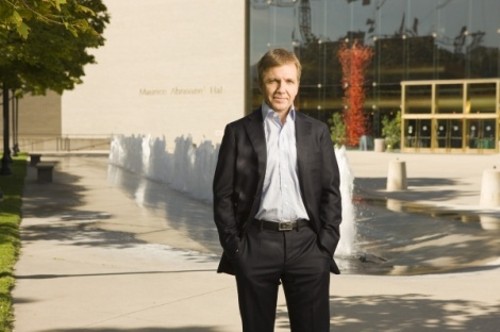Firing Up: Utah Symphony's New Music Director Thierry Fischer
Fischer prepares for his first full season, and beyond.
By Austen DiamondCity Weekly: As Nagoya Philharmonic Orchestra’s chief conductor, you
rearranged the ensemble to create more subtlety and richness. Any such plans for the Utah Symphony?
Thierry Fischer: Like a football manager who wants his team to win, I want the same for the Utah Symphony, although the notion of winning isn’t the same in sports and in arts. I want to place the orchestra in a position where they can play at their best, promoting the highest quality possible. I’m fully aware of the different stages of this fascinating challenge, but all the ingredients are there.
CW: What new energy will you bring?
TF: Energy is a combination of vision, willingness, creativity, determination, hopes, despair, dreams, risks, tradition ... so, I’ll bring a bit of all of that. And, I’ll especially bring my pleasure and privilege to perform live music, which can never be replaced by technology at home or with iPods, mp3, etc.
CW: Where’s the balance between filling seats (by playing popular fare) and creating more complex and meaningful performances?
TF: Although we are all highly motivated to perform very high-level concerts full of energy and creativity, filling the Abravanel Hall is part of a global cultural concept in Utah. It’s the result of teamwork, starting with the orchestra’s vision and artistry, followed by support from the marketing staff, the board and the community in general. Having said that, I’m aware everything starts with the music director’s vision. I can’t wait to start!
CW: Your contract is four years. What’s your long-term strategy?
TF: As a music director, I have the last word in programming. I decide the big concepts, and I’m working closely with Toby Tolokan, vice president of symphony artistic planning. We will mainly concentrate on traditional repertoire, working on big composer cycles—Beethoven, Brahms, Stravinsky—adding some creative surprises (like this autumn, having a chorus a cappella before a massive Bruckner symphony) or a few explorations of lesser-known composers. I also want to invite the highest possible level of American and international guest conductors and soloists.
CW: You began playing music with the flute. How did you choose that instrument? Can you play anything else?
TF: I started the flute by accident ... and loved it! I can play a bit of piano, and, as a student, I used to sing in different choirs. I also have a French Belle Époque repertoire in cabarets. So, I can still sing (in secret).
CW: During those formative musical years, did studying with Austrian conductor Nikolaus Harnoncourt have a profound effect on you?
TF: Meeting him was simply a revelation. It’s the very first time I realized, as a musician, that hard work and talent without historical knowledge doesn’t go very far. And, musical knowledge without hard work, talent and energy is only a half of a performer’s life.
CW: What’s your most unusual musical experience?
TF: The strangest and most beautiful one happened at the end of a performance of Beethoven “Pastoral Symphony” conducted by Harnoncourt. I was still a flute player. The performance by Harnoncourt and the orchestra was so “perfect” that it opened the notion of death in me, in a very positive way. Harnoncourt and the orchestra—very modestly—approached the purest beauty. It meant to me that having touched this during this unforgettable moment, I was actually ready to die.
CW: Regarding conducting, how do you prepare each piece?
TF: You have different phases of preparation, first the very lonely study of scores, followed by the conceptualization of the musical historical part and your musical goals. Then the rehearsals, where a lot of organization is crucial, as the time is limited. However, good rehearsals are not enough. The performance is where your instincts finally take over.
CW: What do you want to evoke with this weekend’s Stravinsky and Tchaikovsky pieces?
TF: The whole program is about “fire” in many different ways. “Fireworks” is a short evocative, energetic piece to open the concert and our ears and eyes. Hilary Hahn, performing Tchaikowsky’s Violin Concerto, is very simply one of the very best violin player in the world. Her musicality, her technique will just light the fire in the hall. Then, “Firebird,” with the apparition of the firebird, its capture, his supplications, the related dances around the games with the Princesses, the apparition of the immortal “Kastchei,” followed by the Infernal Dance. And, finally, the disappearance of Kastchei’s palace and sortileges in an amazingly joyful and uplifting final dance!
UTAH SYMPHONY:
TCHAIKOVSKY’S VIOLIN CONCERTO STRAVINSKY’S
“FIREWORKS” & “THE FIREBIRD”
Abravanel Hall
123 W. South Temple
801-355-2787
Sept. 24-25
8 p.m.
$20-$55
UtahSymphony.org
More by Austen Diamond
-
Wasted Space
342 S. State, Salt Lake City
- May 6, 2015
-
Jackalope Lounge
372 S. State, Salt Lake City
- Apr 22, 2015
-
Geeks Who Drink at Piper Down Pub
1492 S. State, Salt Lake City
- Apr 15, 2015
- More »
Latest in Arts & Entertainment
Readers also liked…
-
New TV for January 2023
Mayfair Witches, Velma, The Last of Us, Poker Face and more premieres
- Jan 4, 2023



